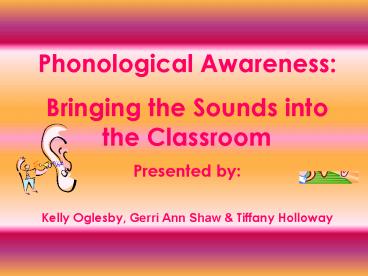Phonological Awareness: - PowerPoint PPT Presentation
1 / 16
Title:
Phonological Awareness:
Description:
... e., rhyme, alliteration, sentence segmentation, syllable, onset and rime, ... Alliteration. Students practice repeating and producing alliterative phrases. ... – PowerPoint PPT presentation
Number of Views:310
Avg rating:3.0/5.0
Title: Phonological Awareness:
1
Phonological Awareness Bringing the Sounds into
the Classroom Presented by Kelly Oglesby, Gerri
Ann Shaw Tiffany Holloway
2
Please make sure all cell phones are turned to
silent and/or vibrate.
3
Lets Use Our Time Wisely!
- Welcome and greet
- The Big Five of Reading
- What is Phonological Awareness?
- Phonological Awareness vs. Phonics
- Make-n-Take - 5 items for your classroom
- 1. Initial Sound Card Games
- 2. Picture Match for Initial Consonant Game
- 3. Word Family Rhyme Game
- 4. A to Z Picture Cards
- 5. Letter Monster Activity
4
The Big Five of Reading
1. Phonemic Awareness 2. Phonics 3.
Fluency 4. Vocabulary 5. Comprehension
These are considered the core elements of
successful classroom reading instruction. The
idea of a sixth component has been suggested due
to it being the culmination of the first five.
The suggested sixth component would be called
Written Expression.
5
What is Phonological Awareness?
Phonological Awareness is defined as ones
sensitivity to, or explicit awareness of, the
phonological structure of words in ones
language. It encompasses an awareness of
individual words in sentences, syllables, and
onset and rime segments as well as awareness of
individual phonemes in words. Phonological
Awareness is considered an umbrella or broad
term, which covers aspects of sound
identification and manipulation in spoken
language. Activities in Phonological Awareness
are based on a progression of skill difficulty
(i.e., rhyme, alliteration, sentence
segmentation, syllable, onset and rime, and
phonemes). The goal of Phonological Awareness
instruction is to develop an awareness that words
are composed of individual sounds, or phonemes,
and to develop the ability to manipulate sounds
in words.
6
Phonological Awareness Examples
Rhyme Students practice recognizing and producing
words that rhyme. Alliteration Students practice
repeating and producing alliterative phrases.
Sentence Segmentation Students practice
segmenting sentences into words. Syllables Studen
ts practice blending and segmenting syllables in
words. Onset and Rime Students practice
identifying the initial consonant or consonants
(onset) and the vowel and any consonants that
follow it (rime). Phonemes Students
practice blending, segmenting, manipulating, and
deleting the
individual phonemes (sounds) in words.
7
What are the correct sounds?
http//free-reading.net/index.php?titleMost_commo
n_letter_sounds_28audio_clips29a http//genkie
nglish.net/phonics.htm
8
Phonological Awareness vs. Phonics
Phonics is the study of the relationship between
letters and the sounds they represent it is also
used to describe reading instruction that teaches
sound-symbol correspondences. The goal of Phonics
instruction is to help children use the
sound-symbol relationship to read and write
words. Phonological awareness is an
encompassing term that involves working with the
sounds of language at the word, syllable, and
phoneme level. Phonics is used to describe the
skills and generalizations readers need to relate
printed symbols back to the printed word.
Phonological awareness is a more fundamental,
underlying skill necessary for successful
phonics skill development.
9
Activity 1
10
Activity 2
11
Activity 3
12
Activity 4
13
Activity 5
Make sure you tape a baggie to the back of the
open mouth so the kids can feed the monster as
you sing along!
14
Website Resources
http//free-reading.net/index.php?titlePicture_ca
rds http//www.fcrr.org/Curriculum/studentCenterA
ctivities.htm http//www.edb.utexas.edu/readstron
g/rhyming.html http//curry.edschool.virginia.edu
/go/wil/rimes_and_rhymes.htm http//pbskids.org/l
ions/videos/ulcase.html
15
Make sure you check the websites for these great
books!
A little something for your classroom libraries!
16
Thank you for coming and please let us know if
you need further ideas, support or resources.































